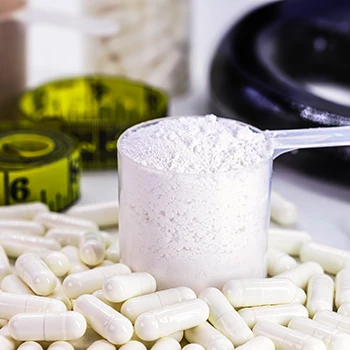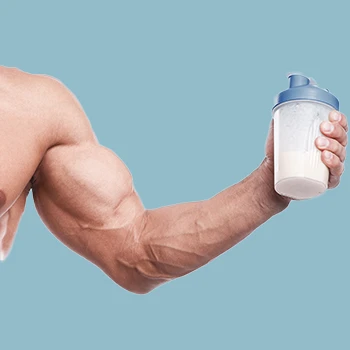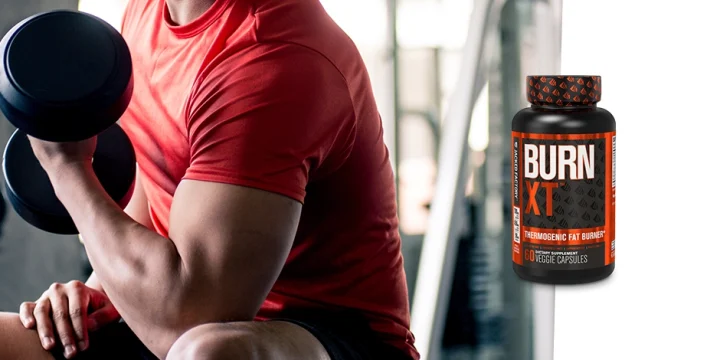Due to the nature of my job, I consider myself well-informed about supplements and all their applications.
However, the other day, one of my clients came up with a question: could a mass gainer have the opposite effect? He claims that it makes him eat less during the day and that he has reported some noticeable weight loss.
I simply had to check this absurd possibility, so with my dietitian's assistance, I conducted a 4-week study on myself and a few of my clients to find the answer.
These are our results.
Quick Summary
- If taken strategically, with less food intake and junk food elimination, a mass gainer could be a helpful supplement for weight loss.
- Since this supplement's common effect is body fat buildup, you must be careful and use it in smaller doses than recommended or in full doses on particular days as an actual meal replacement.
- Mass gainers aren’t just about calories and muscle growth; they may also affect hormonal regulation.
- Regardless, actual supplements that could help you lose weight undeniably include fat burners, protein powders, or even pre-workouts.
Could Mass Gainer Give You an Opposite Effect?

Mass gainers might backfire, leading to lower calorie intake due to prolonged fullness. However, if you're eating more calories than you burn, they're not your ally in weight loss.
Packed with 500 to 1000 calories per serving, these supplements are calorie bombs, primarily from carbs. And here's the kicker: excess carbs turn into fat through a process called de novo lipogenesis [1].
But wait, there's more. High-carb intake from mass gainers can spike your insulin, leading to sudden hunger pangs. Unlike whole foods, they lack fiber, which is key to controlling sugar release and appetite.
"The downside to mass gainers is that muscle doesn't come on at a measurable rate. So if the idea is to gain weight, it's fine. If the idea is to gain muscle, then it can be misleading. Honestly, products like this are probably better in the clinical setting as a way to prevent atrophy."
- Trevor Kashey, Ph.D. Biochemist
These calorie giants often contain creatine, which, according to Europe PMC, can help with water retention and weight gain [2]. Without careful use, you'll end up eating too much, craving more, and gaining fat, not muscle.
Mass gainers also miss out on balanced nutrients for lean muscle growth. To really shape up, you need regular exercise, enough protein, and a diet rich in whole foods.
Understanding the Hormonal Implications of Mass Gainers
Based on my experience, mass gainers aren’t just about calories and muscle growth; they may also affect hormonal regulation.
Two key hormones affected are insulin and growth hormone.
Insulin
Mass gainers, typically high in carbohydrates, can cause spikes in insulin levels.
According to Frontiers in Nutrition, insulin is essential for nutrient absorption and muscle growth [3]. However, its excess can lead to insulin resistance over time.
This condition is not only detrimental to weight management but also increases the risk of type 2 diabetes.
Growth Hormone
Growth hormone plays a pivotal role in muscle growth and fat metabolism.
However, its secretion can be inhibited by high insulin levels, which is a common consequence of consuming mass gainers.
This hormonal imbalance can counteract the benefits of mass gainers, leading to less effective muscle growth and fat loss.
To mitigate the hormonal impacts of mass gainers, we recommend choosing mass gainers with a balanced macronutrient profile and consuming them in conjunction with a well-rounded diet.
Monitoring portion sizes and timing consumption around workouts can also help in maintaining hormonal balance.
How to Use It to Gain Minimal Fat?

To minimize fat gain from mass gainers, focus on how much and when you consume them.
If you’re using a mass gainer, you probably want to consume more calories to sustain or find ways to gain weight with a fast metabolism, primarily as muscle.
But here's the trick: opt for smaller servings than recommended. Mix a quarter serving with whey protein for a balanced calorie boost without going overboard. Always take it before working out to burn off those carbs.
Aiming to lose weight? You're better off with a fat burner tailored more effectively for fat loss.
What Supplements Can Help You Lose Weight?

Supplements like high-quality fat burners and protein powders can help you lose weight.
Here's how.
Fat Burners
Most fat burners have so-called 'thermogenic' ingredients that stimulate heat production in the body.
These ingredients increase basal metabolism and overall energy expenditure, leading to more calories burned and, eventually, weight loss [4].
The most common thermogenic ingredients include caffeine, capsaicin, green tea extract, yohimbine, and bitter orange.
Protein Powders
The second supplement, which isn't primarily tailored for weight loss but can aid in developing lean muscle mass and help you lose weight, is protein powder.
Although protein is one of the main ingredients in most mass gainers, unlike mass gainer, which has plenty of calories from carbs, whey protein is usually 40-90 percent pure protein (amino acids) per serving.
This means it has fewer calories per serving, but that amino acid count makes you satiated for longer and eventually contributes to weight loss.
Moreover, this supplement contains large quantities of amino acid glutamine, which, research suggests, could also help with weight loss [5].
FAQs
What Are the Negative Effects of Mass Gainer?
The negative effects of mass gainer usually boil down to minor digestive issues that include bloating, cramps, and flatulence.
Other side effects (generally if you use mass gainer in large doses) include unhealthy weight gain, increased risk of diabetes, and ultimately kidney and liver damage.
Is Mass Gainer Good for Fast Metabolism?
Mass gainer could be good for fast metabolism since most mass gainers provide large amounts of calories per serving, helping skinny people increase their calorie intake and gain weight.
However, no matter the metabolism rate, mass gainer will eventually make your body create excessive body fat unless accompanied by an intense workout regime to manage consumed calories.
References:
- https://www.nature.com/articles/1600744
- https://europepmc.org/article/med/9884794
- https://www.frontiersin.org/articles/10.3389/fnut.2019.00138/full
- https://www.nature.com/articles/ijo2009299?free=2
- https://www.nature.com/articles/ejcn2014184
About The Author
You May Also Like






